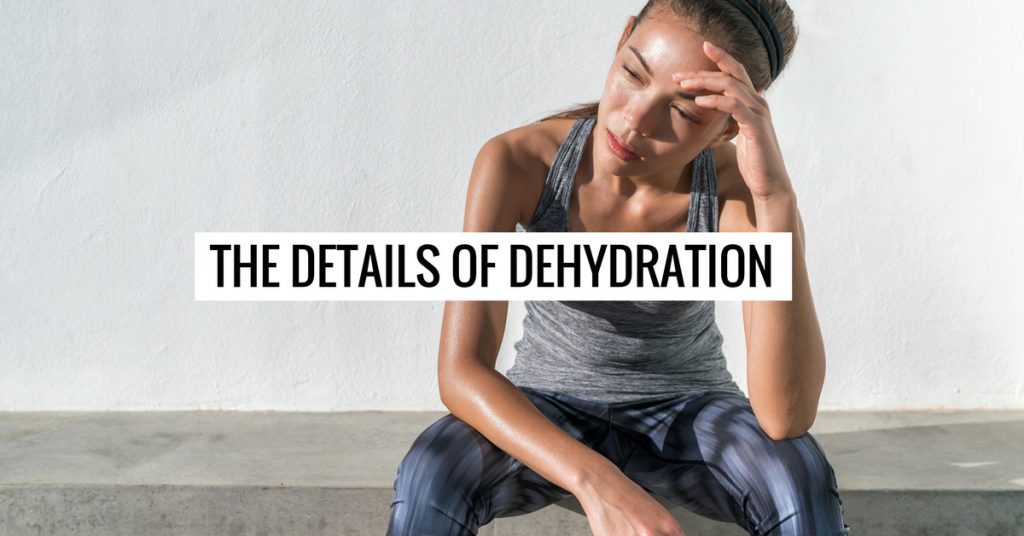What is Dehydration?
Water is essential for our survival. It makes up two thirds of the human body, and plays a large part in your normal functions. It helps to lubricate your joints and eyes, keeps your skin healthy by eliminating toxins, and facilitates proper digestion. Dehydration can occur if too much water leaves the body and not enough waters enters back in. If the water level in your body is reduced, the imbalance between your salts and sugars can affect the way you perform.
What Happens When You Dehydrate?
Our thirst mechanism actually lags behind our actual level of dehydration. So, by the time you feel thirsty, your body is already dehydrated. Our blood is affected as we lose body water without replacing it, and this has a number of knock-on effects.
The blood becomes more concentrated, which triggers your kidneys to retain water, resulting in less frequent urination. Secondly, the blood becomes thicker. The thicker and more concentrated the blood, the harder it is for the cardiovascular system to compensate by increasing heart rate to maintain blood pressure (hence why low blood pressure can be a sign of dehydration). A dehydrated body that is ‘pushed’ during exercise or heat exposure is therefore more at risk to exhaustion or collapse.
A lack of water can also affect the body’s mechanisms for regulating temperature. Overheating can cause hyperthermia: a body temperature greatly above normal (the opposite of the more commonly known, hypothermia, which occurs as the body temperature drops too low).
How does this relate to the sensation of thirst? Well, at a cellular level, ‘shrinkage’ occurs (don’t worry fellas, not the ‘shrinkage’ you associate with swimming in cold water!). Here, water is effectively borrowed in order to maintain other stores, such as the blood. As the brain senses this change, it triggers an increased sensation of thirst.
Causes of Dehydration
We continually lose water via our breath, urine, faeces and skin on a daily basis. Most healthy people are able to regulate their body’s water level through eating and drinking, but for all you athletes out there, along with the elderly, infants and the sick, this is more difficult.
You can lose more water than usual with:
- Excess sweating
- A fever
- Diarrhea
- Vomiting
- Increased urination (some medications such as diuretics can cause an increased urination pattern)
You may not adequately replace lost water because:
- You’re busy and forget to drink enough
- You don’t realise you’re thirsty (the thirst mechanism weakens as a person grows older)
Symptoms
Mild or moderate dehydration:
- Thirst
- Dark yellow urine
- Dry, cool skin
- Headaches
- Muscle cramps
- Lethargy
- Constipation
- Dizziness
- Less frequent urination
- Weakness in muscles
Severe dehydration:
- Fainting
- Extreme thirst
- Sunken eyes
- Confusion, irritability, lethargy
- Lack of sweating
- No tears when crying
- Increased heart rate
- Shriveled and dry skin
- Low blood pressure
- Fever
- And in some serious cases, delirium or unconsciousness
Symptoms for babies and young children:
- Dry diapers for 3 hours or more
- Sunken eyes and cheeks
- Sunken fontanel (soft spot on the top of the skull)
- Fast breathing
- No tears when crying
- Dry mouth and tongue
Prevention/Treatment
Dehydration can be easily prevented, mostly by pure common sense! For instance, be cautious about doing activities in the extreme Australian heat during hottest part of the day. If you are exercising, make replenishing your fluids a priority (and that doesn’t mean through drinking a beer). Monitor your urine; it should be a light yellow colour. If it’s not, then drink enough water until it is (dark urine means your kidney is retaining liquids to enable your body to perform its normal functions, and it stinks!). Your fluid consumption should prevent the perception of thirst. Finally, if you or your family/friends are sick, pay special attention to ensure they are replacing the liquids lost through vomiting, increased sweating or diarrhea.
Mild dehydration can be treated easily. However, if dehydration reaches extreme levels, it will require immediate medical attention and can be life threatening. So get drinking more water and less wine!
